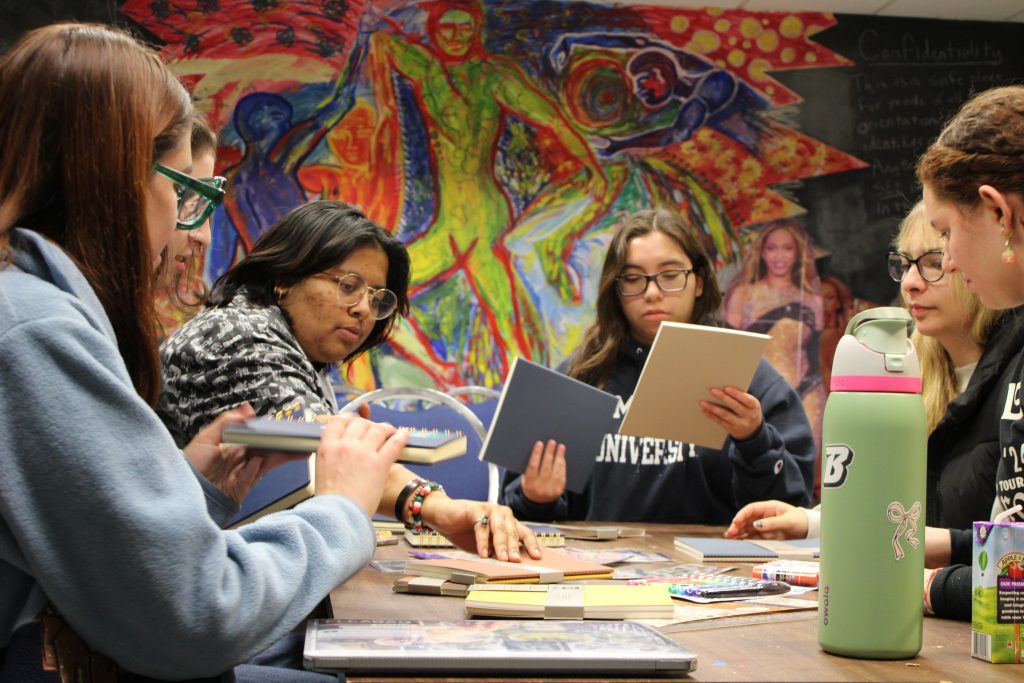The Rainbow Pride Union and the Domestic and Oppressive Violence Education organization collaborated this week to host a roundtable discussion on domestic violence in LGBTQ+ relationships.
Held on Monday in the University Union, Executive Board members from both organizations co-facilitated a presentation on how interpersonal violence affects queer partnerships. Those in attendance also participated in a discussion surrounding these issues, and resources for those struggling with domestic violence were promoted.
“Through the DOVE collaboration with RPU, our organization wishes to shed light on issues of intimate partner violence within the queer community, a topic that is commonly overlooked and undereducated on,” wrote Sarah Lydon, the president of DOVE, vice president of RPU and a senior majoring in philosophy, politics and law. “We are holding a presentation surrounding these issues, and how to break down the stigma of discussing domestic violence within the LGBTQ+ community so that people can protect themselves and their friends. We hope to provide a safe space where people can share their experiences, as well as decompress and decorate journals.”
The presentation began with presenters highlighting broader definitions and statistical findings about domestic violence in the United States. According to Domestic Abuse & Sexual Assault Intervention Services, domestic violence — or interpersonal violence — includes willful intimidation, physical assault, battery, sexual assault and other abusive behavior as part of a systematic pattern of power. This can include sexual, emotional, economic, physical, verbal and psychological abuse.
Research has shown that rates of interpersonal violence among LGBTQ+ college students are as high as 50 percent and are nine times greater among transgender students compared to their cisgender peers. According to the 2015 U.S. Transgender Survey, more than half of transgender and nonbinary individuals have experienced some form of interpersonal violence during their lifetime.
Organizers described how myths surrounding domestic violence in queer relationships are perpetuated over time. One of the biggest factors they discussed was stigma, as some hold the belief that LGBTQ+ relationships cannot be abusive or that interpersonal violence is only perpetuated by cisgender men against cisgender women. LGBTQ+ individuals may also feel unsafe reporting their experiences of violence to authorities due to the possibility that they would not be believed or taken seriously.
The presenters then asked attendees to participate in a broader discussion about how to break the stigma around interpersonal violence in queer communities. Responses included having more representation in the media, creating spaces for more conversations about queer partnerships and different relationship dynamics in general and initiating communication between cisgender and queer individuals.
The speakers wrapped up the discussion by sharing resources for individuals facing interpersonal violence situations, including the student-run SEEK hotline — a nonemergency helpline that can be reached at (607) 777-4357 between 7 to 10 p.m. while dorms are open — and the Violence, Abuse and Rape Crisis Center in Old Johnson Hall, which allows individuals who have experienced interpersonal violence to speak with others and use therapeutic craft supplies and computer-based healing software in a relaxed atmosphere. Local resources include the Crime Victims Assistance Center — reachable at (607) 722-4256 — which provides 24-hour support through its crisis hotline and short-term counseling and advocacy services.
“I thought that this [event] was a good idea to kind of help educate people, but also provide them [with] some resources at the end, because there are a lot of resources on Binghamton’s campus that I didn’t even know about, but through this club, have learned a lot about them,” Lydon said. “Especially CVAC and VARCC, these are great resources that people are not really exposed to, they’re not spoken about on campus tours, they’re not spoken about by the school itself. So it’s like they’re kind of hidden, which is a big problem when it comes to seeking help because people are reluctant in the first place, but then especially when they are not easily accessible, then that’s another hurdle.”
For students interested in getting involved, DOVE meets on Mondays and Wednesdays at 6:30 p.m., with an internship position opening in the spring. RPU plans to revitalize its presence on campus to provide a safe space for LGBTQ+ students looking to express themselves politically, creatively and socially through a variety of campus activities. Students are encouraged to remain on the lookout for RPU events.
Craft supplies and free journals were supplied, and space was provided to continue the discussion and casually chat about other subjects.
“I think it’s really cool that there’s organizations like RPU and like DOVE that are putting in the work to spread awareness and try to really reach everybody that they possibly can on campus, give them the resources, the community and the space and the people that they need, as it’s kind of hard to find that,” said Leora Eisenberger, RPU’s marketing director and a senior majoring in history.



